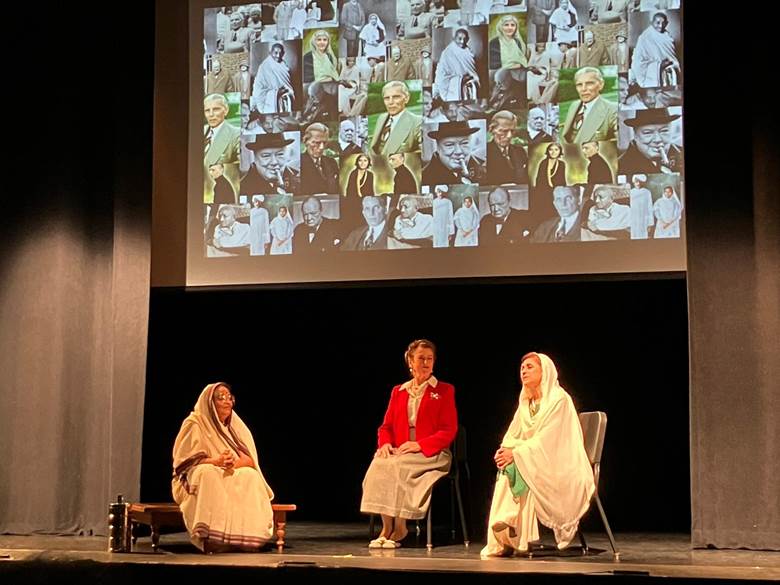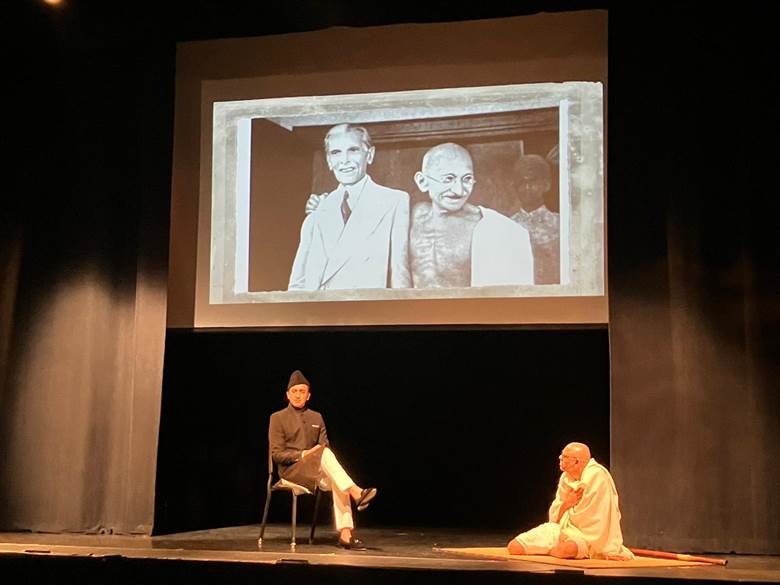
Manjula, Director of Education at the Smithsonian Institution, tells us the idea behind this inspiration. “ As the world becomes more entrenched in war, religious intolerance, ethnic divisiveness ‘Gandhi & Jinnah Return Home,’ conveys the universal and critically important message of peace, harmony, love and unity and gender equality
Gandhi & Jinnah Return Home - A Peacebuilding Initiative
By Haya Fatima Sehgal
A peacebuilding initiative between India and Pakistan came to light in the form of a brilliantly scripted play in Washington DC. Akbar Ahmed’s ‘Gandhi and Jinnah Return Home’ has been making waves from the Greenberg Theatre Auditorium at the American University. As several Indian friends received their Pakistani ones warmly at the door there was a feeling of camaraderie and goodness which has evolved into evocative conversations, invitations, and open doors. Perhaps this peacebuilding cultural fest is going to be the start of many more dialogues in the near future.
It comes as no surprise that the highly respected Ambassador Akbar Ahmed is the guiding force and script writer on this peacebuilding initiative. Alongside his colleague, the beautiful Manjula Kumar (Director and Producer), this venture brings forth bold and open dialogue which is much needed for both countries to forge ties of peace in the new world.
Manjula, a Director of Education at the Smithsonian Institution tells us the idea behind this inspiration. “ As the world becomes more entrenched in war, religious intolerance, ethnic divisiveness ‘Gandhi & Jinnah Return Home,’ conveys the universal and critically important message of Peace, Harmony, Love and Unity and gender equality. The play is even more relevant today - emphasizing the need for Secularism, Universal Truth and Pluralism. The Arts provide a special lens through which we see our world, our humanity, with its strengths and weaknesses.”
We see deeply moving conversations and the portrayal of what both the dynamic Muhammad Ali Jinnah (played by Farhan Bhaba) or what the peace-loving Mahatma Gandhi (played by Sri Mirajkar) would feel, should they have returned to their native countries. The play evokes thoughtful conversations and intellectual exchange on differing viewpoints on culture, interaction and especially religious harmony.
Manjula Kumar has outdone herself as far as artistic direction is concerned. Intermittent moments see a beautiful exchange where both sides provide the harmonization of religious songs from the two; the ever so beautiful and mesmerizing religious bhajan ‘Ishwar, Allah Tere Naam’ and, ‘Labbe Ati Hai Dua from either side is heard.
We see them intersecting ever so slightly as they cross each other by, then pulling away. A well-orchestrated attempt to creatively show that each religious sensitivity can be addressed as living in perfect harmony with their own beliefs, side by side.
At one point, we see a narration of an excerpt from Faiz Ahmed Faiz’s poetry from ‘The Dawn of Freedom.’
The depiction of the role of the British in all of this seen as an interlocutor between the two parties from the perspective of Winston Churchill (Peter Poggioli) which brought forward a third perspective on the matter from a Western viewpoint. We see how adamantly he claims that this decision of the two countries was the breaking apart of the “Jewel in the Crown”, referring to Her Majesty’s “British Raaj.”
Here, his wife Clementine Churchill (Mary Anthony) plays a major role in explaining his ways to the other women; Kasturba Gandhi (Nisha Narayan) and Fatima Jinnah (Sujata Avasthi). We see the men have beside them the support and love of their female counterparts. One sees the importance of these women to have played a supportive role in the lives of such great men in history.

Mentions should be made of the acting segments by Rohan Singh (playing a student in Karachi), Meena Kumari (Soumya Kini), Anil Kapoor (Robert Nazareth) and the Pakistani Professor (Farrukh Iqbal)
Despite the dynamic dialogue and conversations between the men and at times the intimate friendship between the women, there was the much apprehensive question of what was happening in the countries today. From the mention of the state of Gujarat today, to alluding to the persecution in India of the minorities to the religiously driven lynch mobs in Pakistan - all issues were touched upon. Although exceedingly sensitive topics, I do feel they were done in a realistic and very balanced manner.
Here we also see both the visionaries Mahatma Gandhi and Jinnah have their own idea of a safe space for their people. Mahatma Gandhi a believer of peace truly does want India to stay together as a unit with both religions intact within it. Then there comes reasoning from Jinnah who argues for a safe space for the Muslims and wants independence as he feels that is where they would be able to practice their religious beliefs separately. Both viewpoints were well heard.
As a socio-cultural analyst, one can only say each was trying a way to resolve the considerable issues, but the separation had to occur for several reasons in 1947.
As a Pakistani viewing this play, I only reiterate that more such dialogues should take place to create a better route into the ‘Naya Zamana’ (New World) as the actors hailed. A Naya Zamana would and can only happen with gujmore people as they formulate better policies for the citizens of their respective countries and a better understanding of each other’s place respectfully in the world.
One hopes that given more open-ended conversations and keeping the respect and security of all communities, this idea would one day be given a platform as a form of a movie in both India and Pakistan. As Manjula Kumar put it aptly the play itself was the culmination of a joint effort; Hindus, Muslims, Jews and Christians and Sikhs from the cast to the producers came together to make this happen.
A new globalized world is now coming towards talks of regional stability which would need to include both India and Pakistan. Perhaps the idea of ultimate issues being resolved is a far cry or not there yet. But I must disagree with Churchill’s dialogue in the play “The twain shall never meet.” One does feel there are several pathways and routes in the form of trade, cultural values and art that must be taken and forged for more peaceful language between the two.
The writer Haya Sehgal is an analyst with a focus on the Indo-Pacific.

